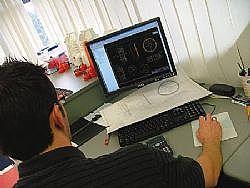WHEN Graham Render and Simon Chan, directors of CAMEX, recently attended a New Zealand Trade & Enterprise facilitated seminar hosted by Plastics New Zealand, they were a little surprised to learn that there is a perception in the plastics industry that the toolmaking skill level in New Zealand is somewhat lacking.
They say this is simply not the case.
Following a fact-finding mission to China earlier this year, Render is also quick to dispel another myth surrounding toolmaking in this country the one about it being more expensive here.
Plastics companies do not have to go offshore to get a better deal on their tool and die making requirements says Render.
Having been to a number of Chinese toolmakers in August, Ive discovered that they do not always beat us on speed, quality, and price. Our prices are proving cheaper than most Chinese prices and we deliver sooner, I have documented proof if anyone wants to see it.
His message for New Zealand industry is clear when it comes to tool and die making, CNC machining and tool design stay in New Zealand; youll get a better deal, delivery will be on time and youll end up with a much better product.
The rather significant investment that CAMEX made in its design and manufacturing facility on Aucklands North Shore recently is testimony to the confidence it has in the local CAD/CAM market. The company has taken on additional design staff and invested in the latest high-end, complementary CAD/CAM software programs to stay ahead of the game.
Long on experience
Graham Render has been involved in the plastics toolmaking industry since 1980. He says his toolmaking background is a perfect match with co-director Simon Chans skills as a mechanical engineer. Chan, who established CAMEX in 1995, leads the companys design team.
Render says the dynamics of the company have evolved over the years with the advance in technology. For example, back in the 80s there may have been a single designer working on paper with multiple toolmakers who often made vital production decisions on the fly. Today, with computer models as accurate as the tools themselves, the software helps makes these decisions. he says.
Thanks to the latest manufacturing processes, Render says the lead time for tools and dies has improved dramatically in recent years, allowing clients to get product to market in a much shorter timeframe.
Nowadays the expectations of clients are much higher theyre looking for an all-encompassing service solution which starts with an idea and runs right through to final development, he says.
This is why design is so much more important, according to Render, and theres more emphasis on what value CAMEX can add to a clients business. For example, is the clients machinery running fast enough; should they utilise different materials, or perhaps the deployment of robotics to remove product from a tool is a better option?
We focus a lot of our efforts into working smarter with our customers, adds Render.
Thin wall specialists
CAMEX undertakes a number of special projects for clients, such as tooling for filling line machinery, packaging machinery and assembly machines. Its expertise covers design (including complex 3D modelling), tooling for injection moulds and blow moulds, as well as foundry tooling, press tooling and tooling for thermo forming.
To accomplish this it has equipped itself with state-of-the-art CNC machinery, including Matsuura four axis and three axis machines, Kasuga three axis machines, and a Daewoo live tooling CNC lathe. CAMEX offers a two tonne workpiece capability and can work up to 1500mm travel.
The company specialises in rigid plastic packaging moulds and thin wall injection moulding down to 0.5mm thickness is a particular specialty.
To illustrate the companys design flexibility and attention for accuracy, in recent times CAMEX has been manufacturing limited edition hunting rifles, with the discerning North American collectors market in mind. Judging by the reaction so far, the company is onto another winner and it is proof indeed that precision machining and tool and die manufacture is still very much alive and well in New Zealand.






